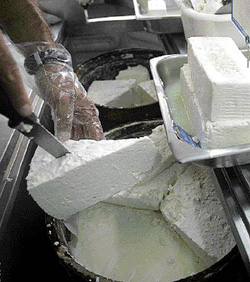Following lengthy court battles over the past 16 years, Greece irrevocably won the exclusive right to call its white salty cheese 'feta', as the European Union's top court ended on October 25 the country's acrimonious dispute with Denmark and Germany.
The European Court of Justice ruled that the definition of feta was reserved for cheese from Greece alone because it had been registered as a protected "designation of origin" product by the European Commission in 2002.
The ruling was a landmark victory for the Greek rural landscape, where feta is believed to have been produced from a blend of sheep's and goat's milk for the past 6,000 years. Denmark and Germany wanted to use the same Greek name for feta-like cheese made in their countries.
Beleaguered Agriculture Minister Evangelos Bassiakos, who is battling critics at home over his handling of a bird flu scare, welcomed the ruling as the end of the legal battle. "This is a historic vindication of Greek dairy farming and agriculture which is endowed with several products of unique natural quality and ingredients through the millennia." There is no right of appeal against the October 25 decision.
The decision was also welcomed by Greek dairy producers, who said the ruling would help market feta against rival products. "We can now relaunch our campaign to promote the advantages of our products," said a statement by the Association of Greek Dairy Farmers and Manufacturers.
Very special product
Explaining its decision, the court referred to a 2002 commission opinion that special breeds of sheep and goats and the flora in Greece gave Greek feta a specific aroma and flavour. It also justified its decision by saying that feta in other EU states was often associated with Greece and its culture and was marketed with labels showing its Greek heritage.
But the decision drew criticism from the Danish Dairy Board, which said it undermined legal rights in Europe. The Greek government has campaigned in the EU court since 1989 for geographical protection of local feta.
Germany and Denmark had asked the European court to annul the decision by the commission in 2002 to make feta a Greek-only product under its 'protected designation of origin' directive - the same kind of protection as that given to Italy's parma ham and French champagne.
The commission welcomed the court ruling and said it would set an important precedent for the EU's system of protecting the names of certain food products which are traditionally made in specific regions rather than by competing manufacturers.
But Hans Bender, director of the Danish Dairy Board's office in Brussels, slammed the ruling. "This ruling goes against all law... It is scandalous," Bender said, adding that the court had gone against a 1999 ruling of its own when it decided feta should not be a protected name. That ruling, however, was issued by a lower chamber of the EU Court which was successfully appealed by Greece.
Losing battle
Nevertheless, Danish dairy producers, unable to meet the colour and taste features of the Greek cheese, have cut their feta production in recent years and the impact of the ruling is likely not to be as big a problem as it would have been in the past.
Denmark sued the European Commission earlier this year for giving Greece exclusive rights to produce feta cheese, calling the product a generic foodstuff, not a regional delicacy. "The government doesn't believe that feta is a generic name of origin but a generic name of goods, which cannot be protected," Denmark's Food Minister Mariann Fischer Boel said.
Greece has tried since 1989 to have the EU ban other nations from using the label, saying the cheese has been made there since ancient times. In October, the EU's head office added feta to a list of hundreds of gourmet products given "designation of origin" protection.
That means they can only be produced in a given area, using traditional methods.
At the same time, feta producers in Denmark, France and Germany were given five years to find another name for their product or cease production. Denmark was victorious in a 1999 EU court hearing against Greece getting exclusive rights to the feta name. But by introducing new legislation in 2002, the European Commission was able to sidestep the court decision.
Unnaturally white?
According to the EU court ruling, feta cheese can only be produced in certain parts of Greece and with strict product specifications.
Greece has claimed feta should be made only from sheep's milk, or a mixture of goat and sheep's milk, from livestock that eat grass and flowers in the rugged Greek countryside.
The other EU countries often make it with cow's milk and then whiten it to avoid the yellow colour that results from the ageing of cow's milk.
Although German and French producers also make feta, Danes had taken the lead in campaigns to have feta declared a generic product like cheddar or camembert, in recognition of the fact that production has spread well beyond the cheese's origin.
The EU has nearly 150 cheeses on its list of protected regional products, including gorgonzola from Italy, French brie de Meaux and English Stilton, as well as 19 other Greek cheeses and Danish blue.
Denmark exports most of the 30,000 tonnes of feta it produces annually, bringing in 500,000 kroner ($70,000) in sales to Europe and the Middle East. By comparison, Greece makes some 115,000 tonnes of the cheese, mostly for domestic consumption.



